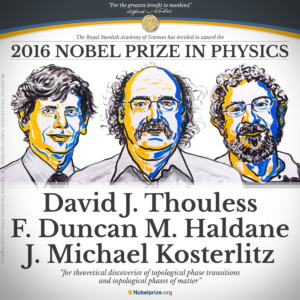Today’s Nobel Prize in Physics given to the UW’s Professor David Thouless shows how important it is for the UW to explain itself as more than just the home of our wondrous Husky football team.
 The 2016 Nobel Prize in physics was awarded Tuesday to David Thouless from the University of Washington along with Duncan Haldane from Princeton University and J. Michael Kosterlitz from Brown University.
The 2016 Nobel Prize in physics was awarded Tuesday to David Thouless from the University of Washington along with Duncan Haldane from Princeton University and J. Michael Kosterlitz from Brown University.
The three physicists came up with the mathematical framework to explain properties of unusual phases of matter such as superconductors, superfluids and thin magnetic films. Their work is revolutionizing our ability to build tiny devices including computers that rival or surpass the human brain.
Professor Thouless Thouless, 82, is a professor emeritus at the University of Washington. He will win half of the approximately million dollar prize. The other half will be shared between Haldane and Kosterlitz.
From the award, “In the early 1970s, Michael Kosterlitz and David Thouless overturned the then current theory that superconductivity or suprafluidity could not occur in thin layers. They demonstrated that superconductivity could occur at low temperatures and also explained the mechanism, phase transition, that makes superconductivity disappear at higher temperatures. In the 1980s, Thouless was able to explain a previous experiment with very thin electrically conducting layers in which conductance was precisely measured as integer steps. Thouless was able to explain an experiment conducted with a very thin layer of material. Its electrical resistance varied in response to changes in a magnetic field, but while the strength of the field was changed smoothly, the resistance changed in sharply defined steps. This effect is so precise that it is now used to define the unit of electrical resistance, the ohm.
Watch Video
This award has special meaning for the UW. We, and especially our state legislators and citizens, need to realize that the UW is the ONLY world class research university not just in WASTATE but all the way from San Francisco to Vancouver British Columbia.
Elements of Cascadia would include other regional issues that also affect us:
transportation: a corridor would require high speed rail not only from downtown Seattle to downtown Vancouver, to serve cities along the way. This would disperse our housing and require more regional colleges like Western Washington.
the border: the usual discussion is about low wage immigrants across the Mexico border. That is hardly an issue here.
—
Pathology